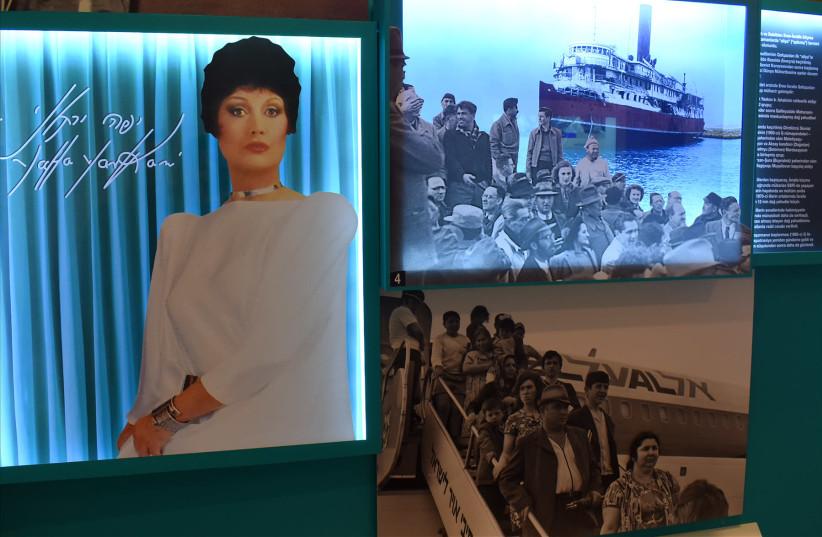The life of Yafa Yarkoni, the graceful woman with a beautiful voice who embodied the spirit of a nation at war, is now explored at the Habima National Theater in the form of a musical. Written by Guy Maroz and directed by Eldar Groisman, Ha’amini Yom Yavo (Believe the Day Will Come) includes some of the best-known stars of the Hebrew stage.
Elay Almani plays the role of Yarkoni as a young newlywed who rapidly became a sensational star in what was known at the time as “salon tunes.” Einat Sarouf shines in the role of the established Yarkoni, marking a time in her life when, thanks to lyrics written by Haim Gouri, Raphael Klatchkin, Naomi Shemer, and others, she attained a special place in the nation’s heart and international recognition. Gila Almagor, in the role of a mature artist faced with the fickle memory of her public, won longstanding ovations after this premiere.
The musical begins with a hospital bed, where a medical doctor (Tal Mosseri) gently explains to Yarkoni’s daughter Rina (Lilian Barreto) that her mother (Almagor) suffers from Alzheimer’s disease. The stunned daughter must defend her mother’s reputation, face a crisis in her own marriage, and support a demanding older parent.
Trip down memory lane
Meanwhile, the audience is invited to take a trip down memory lane with Yarkoni as she looks back at a life that some would call a phenomenal success story. A clue to this narrative device can be appreciated when Almani sings a few lines from Habibi. Almagor is there watching her, tapping her finger on the glass as if she is creating the rhythm in her own mind, watching her younger self perform.
For this musical, music director Lior Ronen crafted two impressive mini-shows, one sung by Almani and the other by Sarouf. Both performances are necessary and excellent pastiches – a condensed selection of Yarkoni’s most iconic songs, trimmed down to a few key lyrics, performed with heart and gusto during spectacular dance routines created by Tut Mullor. Set designer Adam Keller deserves praise for his precise, imaginative sets that take us from Tel Aviv’s bars to the Negev desert, with its warm tunes of reddish-yellow in the background, and then to the clinically cold hospital scenes with their unforgiving light.

This works wonderfully well, partly due to the audience’s deep familiarity with Yarkoni’s music. The clear-cut thematic division seen on stage between an alleged Rebetiko-like period, when Yarkoni was a people’s diva, and a second period, when she was an Israeli Marlene Dietrich singing “Lili Marlene” to the boys at the front, should be taken with a grain of salt.
On stage, a pipe-smoking Haim Gouri (Tal Kallai) hands her the lyrics to “Bab El Wad,” a song written to remember the fierce fighting at Sha’ar HaGai during the War of Independence. Yarkoni sings it and is rapidly transformed to the status of the nation’s “songstress of the war,” despite noting that “wars are terrible; only the songs are pretty.”
Gouri, Haim Hefer, Yoram Kaniuk, and others served in the Palmach. They fought for a new country that they were also able to culturally shape at a level that today would seem impossible. A poet takes a drink, composes a poem, and then passes it on to a singer, who turns it into a timeless musical masterpiece that continues to play on the radio seven decades later.
“There were times when we defended the outpost,” Hefer wrote in There Were Such Times, which is included in the musical. “Now on the outpost, a city was built.”
When Yarkoni died, Kaniuk shared how she had come to perform for his Palmach battalion. Yarkoni sang “War is a Dream,” a tango written by Tolly Reviv. Then-Palmach Education Officer Benny Marshak had a fit. The tango, Rebetiko, and pop music were all salon tunes – “false Idols” to the ideologically driven older men who, like him, left Europe to create a Jewish homeland.
Back then, female singers became the voice of a nation at war. Fairouz wrote and sang “Al Quds Al Atiqa” (Old Jerusalem) and Umm Kalthoum sang “I Now Have a Rifle” (written by Nizar Qabbani,) both of them Arab songs about the conflict. In a similar way, Yarkoni and Shoshana Damari reside in the collective Israeli soul. Klatchkin, who wrote the poem from which the title of this musical is taken, says that Israel’s wars are fought so that the day will come when we may “breathe and live.”
The choice to have Almagor, known for her pro-peace views, play the role of Yarkoni, who was rebuked by the public over a possibly misunderstood radio interview in which she spoke out against the ongoing military control of the Gaza Strip, is an inspired one.
In a pivotal scene, hecklers interrupt Yarkoni (Almagor) during her singing, questioning her loyalty to the state. This is a troubling but very sharp reminder of how fragile free speech is in a democracy still facing unyielding hostility.
‘Believe the Day Will Come’ will be shown June 4-Aug. 5. Hebrew only. Two hours with one intermission. NIS 250 per ticket. Dohl Center, 76 Hatikva St., Tel Aviv. Call (03) 6295555 to book or visit https://www.habima.co.il/en/shows/believe-the-day-will-come/.
The musical was produced with the kind support of Dita and Alex Landsberg.
